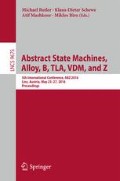Abstract
Abstract State Machines can be used to specify arbitrary system behaviour. However, when writing executable specifications one often has to write additional statements which organise how, e.g., in which order, the rules are executed. This reduces the readability and comprehensibility of specifications and can introduce additional defects to them. We propose a new syntax construct for the specification of control flow for the ASM language which improves the compactness and readability of specifications by providing syntactic elements for often manually realised behaviour. This construct enables to parametrise which rules shall be selected for execution and how the selected rules are executed. We illustrate how the control construct can improve the code’s readability on some examples. The proposed control construct is also released as a plugin for CoreASM.
Access this chapter
Tax calculation will be finalised at checkout
Purchases are for personal use only
References
Arendt, T., Biermann, E., Jurack, S., Krause, C., Taentzer, G.: Henshin: advanced concepts and tools for in-place EMF model transformations. In: Petriu, D.C., Rouquette, N., Haugen, Ø. (eds.) MODELS 2010, Part I. LNCS, vol. 6394, pp. 121–135. Springer, Heidelberg (2010)
Ashenden, P.J.: The Designer’s Guide to VHDL, 3rd edn. Morgan Kaufmann Publishers Inc., San Francisco (2008)
Börger, E.: The origins and the development of the ASM method for high level system design and analysis. J. UCS 8(1), 2–74 (2002)
Börger, E., Bolognesi, T.: Remarks on Turbo ASMs for functional equations and recursion schemes. In: Börger, E., Gargantini, A., Riccobene, E. (eds.) ASM 2003. LNCS, vol. 2589, pp. 218–228. Springer, Heidelberg (2003)
Börger, E., Stärk, R.F.: Abstract State Machines. A Method for High-Level System Design and Analysis. Springer, Heidelberg (2003)
Farahbod, R.: CoreASM: an extensible modeling framework & Tool environment for high-level design and analysis of distributed systems. Ph.D. thesis, Simon Fraser University.(2009)
Farahbod, R., Gervasi, V., Glässer, U.: CoreASM: an extensible ASM execution engine. In: Proceedings of the 12th International Workshop on Abstract State Machines, ASM 2005. pp. 153–166 (2005)
Feijs, L.M.G., Jonkers, H.B.M.: Formal Specification and Design. Cambridge Tracts in Theoretical Computer Science. Cambridge University Press, Cambridge (1992)
Fitzgerald, J.S., Larsen, P.G., Verhoef, M.: Vienna Development Method. Wiley Encyclopedia of Computer Science and Engineering (2008)
Gurevich, Y.: Sequential abstract-state machines capture sequential algorithms. ACM Trans. Comput. Logic (TOCL) 1(1), 77–111 (2000)
Gurevich, Y., Schulte, W., Wallace, C.: Investigating Java concurrency using abstract state machines. In: Gurevich, Y., Kutter, P.W., Odersky, M., Thiele, L. (eds.) ASM 2000. LNCS, vol. 1912, pp. 151–176. Springer, Heidelberg (2000)
Johnson, W.W., Story, W.E.: Notes on the “15" puzzle. Am. J. Math. 2(4), 397–404 (1879)
Rozenberg, G. (ed.): Handbook of Graph Grammars and Computing by Graph Transformation : Foundations, vol. 1. World Scientific Pub Co, Singapore (1997)
Russell, S., Norvig, P.: Artificial Intelligence: A Modern Approach, 3rd edn. Prentice Hall Press, Upper Saddle River (2009)
Schroeder, A.: Integrated program measurement and documentation tools. In: Proceedings of the 7th International Conference on Software Engineering, ICSE 1984, pp. 304–313. IEEE Press (1984)
Acknowledgements
First ideas to introduce a UCC originate from a CoreASM workshop in Ulm some time ago. We thank Vincenzo Gervasi, Roozbeh Farahbod, and Simone Zenzaro for inspiring discussions and valuable comments on a preliminary version of this paper. We also thank the anonymous reviewers for their extensive and valuable reviews that helped us improve the paper significantly.
Author information
Authors and Affiliations
Corresponding author
Editor information
Editors and Affiliations
Rights and permissions
Copyright information
© 2016 Springer International Publishing Switzerland
About this paper
Cite this paper
Stegmaier, M., Dausend, M., Raschke, A., Tichy, M. (2016). A Universal Control Construct for Abstract State Machines. In: Butler, M., Schewe, KD., Mashkoor, A., Biro, M. (eds) Abstract State Machines, Alloy, B, TLA, VDM, and Z. ABZ 2016. Lecture Notes in Computer Science(), vol 9675. Springer, Cham. https://doi.org/10.1007/978-3-319-33600-8_2
Download citation
DOI: https://doi.org/10.1007/978-3-319-33600-8_2
Published:
Publisher Name: Springer, Cham
Print ISBN: 978-3-319-33599-5
Online ISBN: 978-3-319-33600-8
eBook Packages: Computer ScienceComputer Science (R0)

